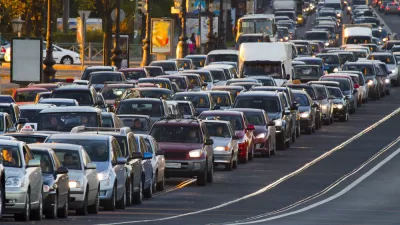As more solo-commuters have moved into the express pay lanes designed to quickly move traffic on Los Angeles's congested freeway system, speeds have dropped and L.A. Metro officials are looking to pricing disincentives to speed things up again.

Express Lanes on the 110 and 10 freeways have become clogged with solo-commuters, resulting in a drop in speed that potentially jeopardizes federal funding. Steve Scauzillo of the San Gabriel Valley Tribune reports that L.A. County Metro officials are now looking at raising prices further to disincentivize use of the Express Lanes during the most congested periods. However, Metro Board members confused by the dynamic pricing strategy aren’t convinced that raising prices will result in faster moving traffic.
The new pricing raises the maximum from $1.40 to $1.50 per mile but only on congested segments and not when delays are caused by road work or an accident. [Shahrzad Amiri, Metro’s executive officer] couldn’t say exactly how much more solo commuters would pay, but said Metro only could raise peak tolls 30 cents more per year. “The current maximum price ... does not appear to be enough of a disincentive for toll-paying customers to choose not to enter the ExpressLanes,” she wrote in a report to the board.
FULL STORY: 110, 10 Freeway ExpressLanes are slowing down and officials aren’t sure of the fix

Maui's Vacation Rental Debate Turns Ugly
Verbal attacks, misinformation campaigns and fistfights plague a high-stakes debate to convert thousands of vacation rentals into long-term housing.

Planetizen Federal Action Tracker
A weekly monitor of how Trump’s orders and actions are impacting planners and planning in America.

San Francisco Suspends Traffic Calming Amidst Record Deaths
Citing “a challenging fiscal landscape,” the city will cease the program on the heels of 42 traffic deaths, including 24 pedestrians.

Adaptive Reuse Will Create Housing in a Suburban Texas Strip Mall
A developer is reimagining a strip mall property as a mixed-use complex with housing and retail.

Study: Anti-Homelessness Laws Don’t Work
Research shows that punitive measures that criminalized unhoused people don’t help reduce homelessness.

In U.S., Urban Gondolas Face Uphill Battle
Cities in Latin America and Europe have embraced aerial transitways — AKA gondolas — as sustainable, convenient urban transport, especially in tricky geographies. American cities have yet to catch up.
Urban Design for Planners 1: Software Tools
This six-course series explores essential urban design concepts using open source software and equips planners with the tools they need to participate fully in the urban design process.
Planning for Universal Design
Learn the tools for implementing Universal Design in planning regulations.
Heyer Gruel & Associates PA
JM Goldson LLC
Custer County Colorado
City of Camden Redevelopment Agency
City of Astoria
Transportation Research & Education Center (TREC) at Portland State University
Jefferson Parish Government
Camden Redevelopment Agency
City of Claremont




























